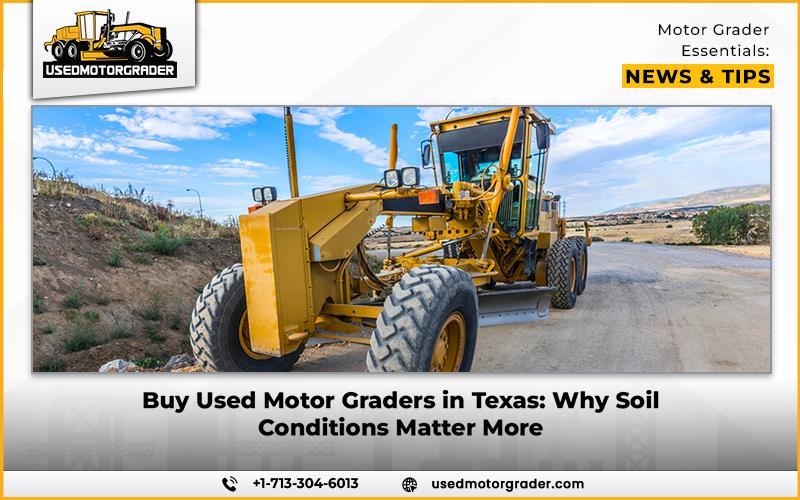Texas Terrain: From Desert Dust to Coastal Clay
Texas stands out in geological variety just like it does in physical size. The soil type in this region affects how you should choose to buy used motor graders in Texas for your needs. Texas contains both dry western desert areas and moist clay and loam regions in its eastern and southern regions. Your selection of a used motor grader depends on the fact that not all graders perform equally across different types of soil conditions. The specific soil conditions in West Texas or the Gulf Coast area determine which features and qualities are required in a used grader.
Why Soil Composition Shapes Equipment Selection
The condition of the earth beneath the grader determines its functioning completely. Since sand provides minimal resistance, it strains tires through their movement across it. The heavy clay ground needs machines that deliver strong hold and turning power, but rock-filled soil destroys the grader underparts and blade edges. By examining the used motor graders for sale options in Texas, you get a big advantage, knowing the different earth types the machine worked on before. It helps you anticipate not only the visible condition of the equipment but also the hidden wear that may affect performance down the road.
Tires, Blades, and Frames: Matching Specs to the Ground Below
Every soil type demands a specific type of grader. Machines stay above softer soil when operators use wider tires or flotation tires. Deep tread tires and reinforced tires suit tougher terrain better than shallow tread and light-duty tires. The blade design comes with different options because smooth soil needs bent blades while tough material needs strengthened edges. Rugged ground can put extra pressure on the machine frame joints and pivots during use. Contractors buying used motor graders should assess their territory and select machines that fit the local surface conditions.
Wear and Tear Patterns You Can’t Ignore
Soil conditions leave permanent marks on machinery, especially in their effect on parts durability. Soil dust and debris easily block machine filters and damage engine parts due to friction. The coastal climate promotes metal corrosion mainly in electrical links and bare metal parts. The use of sticky clay puts pressure on hydraulic systems and decreases mechanical work speed. The graders that Texas buyers purchase have experienced at least one of these environmental effects. Buyers who know their territory analyze graders for signs of damage, especially related to local conditions, by examining seals, links, cutting tools, and cooling systems.
Hydraulics and Controls: Terrain-Responsive Tech Matters
The latest motor graders arrive with built-in smart hydraulic controls and slope-detection technology. These advanced features help you work better in challenging ground conditions, but most budget-focused buyers do not prioritize them. Motor graders work best on Texas grassy slopes and flat wetlands when their control system reacts to changing ground patterns. During your examination of used equipment, determine if the grader offers these features, and also look at its maintenance history. Graders operate effectively for their intended role when their software controls match the actual terrain, so choose machines with calibrated systems.
The Value of Local Use History in Secondhand Machines
The lifespan and condition of a used motor grader depend on how it worked on ranch roads versus construction projects. Knowing the past machine usage helps you make better buying decisions. Did the equipment handle mainly level open ground? Did the machine experience regular operation in humid areas that speed up rust development? Did it perform its work every day over uneven terrain with rocks? The information you learn helps you estimate the machine’s inner and outer condition. Machines that spent their past life working in less demanding conditions and on easy terrain show higher remaining durability and require less maintenance work.
Dealer Knowledge and Soil-Savvy Support
Not every dealer has the knowledge required to guide you toward appropriate machine selection for your site conditions. Many local dealers who serve Texas construction customers can offer the most beneficial advice because they track industry trends daily. They can select proper graders for specific soil types because of their local experience and suggest tire and blade changes, plus soil-specific maintenance. They do more than sell equipment because they assist you in making successful machine ownership decisions by suggesting which machine type suits your work location.
Smart Buyers Think Like Operators, Not Just Owners
When buying a used grader in Texas, you need to understand what daily operators need to succeed. Operators personally understand the differences when working with various soil types and ground slopes under different moisture levels. Their real work experience shows in each press of the blade as they handle both tough and relaxing tasks. To select the right machine, analyze how an operator would use it. Talk to someone who operates graders in the region where you will use your machine. Their experience helps them spot important aspects you might miss, which leads you to better choices or avoids wasting money on wrong decisions.


